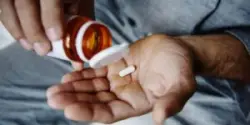
Risperdal (risperidone) is an atypical antipsychotic medication used to treat schizophrenia, a chronic and serious mental disorder. Schizophrenia often causes psychosis, including hallucinations, delusions, thought disorders (or dysfunctional thinking), and movement disorders. Schizophrenia symptoms also include a flat emotional affect as well as reduced interactions and lowered enjoyment in everyday life.
In addition to schizophrenia, Risperdal is also prescribed to treat bipolar disorder (a severe form of depression in which mood swings are rapid and extreme) as well as irritable mood associated with autistic disorder, and ADHD. The positive outcomes achieved by taking Risperdal are increased clarity of thinking and perception, as well as fuller and more productive engagement in everyday life, including work and in close relationships.
RISPERDAL SIDE EFFECTS
As an atypical antipsychotic, Risperdal works by altering and rebalancing chemical processes in the brain. Because it causes such profound changes in brain function, Risperdal can also cause a host of disturbing side effects when taken alone and in conjunction with other medications such as anti-depressants, blood pressure medications, seizure medications, and sedatives.
For a free legal consultation with a Personal Injury Lawyer
FREQUENT SIDE EFFECTS OF RISPERDAL INCLUDE:
- Weight gain
- Stomach pain
- Nausea
- Anxiety
- Decreased sexual ability
- Restlessness Late or missed menstrual periods
- Agitation
- Dry mouth and/or increased saliva
- Vomiting
- Diarrhea or constipation
- Heartburn
- Vision problems
- Difficulty urinating
- Muscle or joint paint
The above side effects are common among many psychoactive medications and can be discomforting. However, Risperdal can cause more serious side effects, like Gynecomastia (a medical condition which causes boys to develop breasts), lactation in young girls, diabetes and stroke.
Risperdal can also lead to a movement disorder known as tardive dyskinesia, which entails involuntary, spasmodic and/or repetitive body movements such as facial grimacing and sticking the tongue out of the mouth, as well as rapid bodily jerking or slow writhing movements.
Doctors recommend that patients taking Risperdal do not drink alcohol and refrain from driving an automobile or operating machinery until the individual side effects of the medication are known.
RISPERDAL LAWSUITS
Risperdal has a long and prevalent history of lawsuits and is one of the most legally disputed medications on the market. The manufacturer of Risperdal, Janssen—along with its parent company Johnson & Johnson—contributed to these problems by ignoring the FDA’s restrictions on marketing the medication to children, especially young boys, and for unapproved, off-label use. To date, Janssen has paid upwards of $5 billion in personal injury and other legal settlements for damages caused to people taking Risperdal.
The majority of legal cases filed against the makers of Risperdal are for Gynecomastia (breast development in boys), lactation in young girls, and stroke—especially in elderly patients with dementia-related psychosis. However, there have also been many Risperdal drug recalls due to contamination of the medication.
By 2002, Risperdal had caused approximately 37 cases of stroke and 16 deaths. From 1999 to 2008, there were over 1,200 serious adverse event reports associated with Risperdal, including 31 reported deaths. In 2005, the FDA issued a black box warning on Risperdal (which is the highest and most severe warning level assigned to medication) to be placed on the drug label.
We Are committed to winning and winning big for our clients





